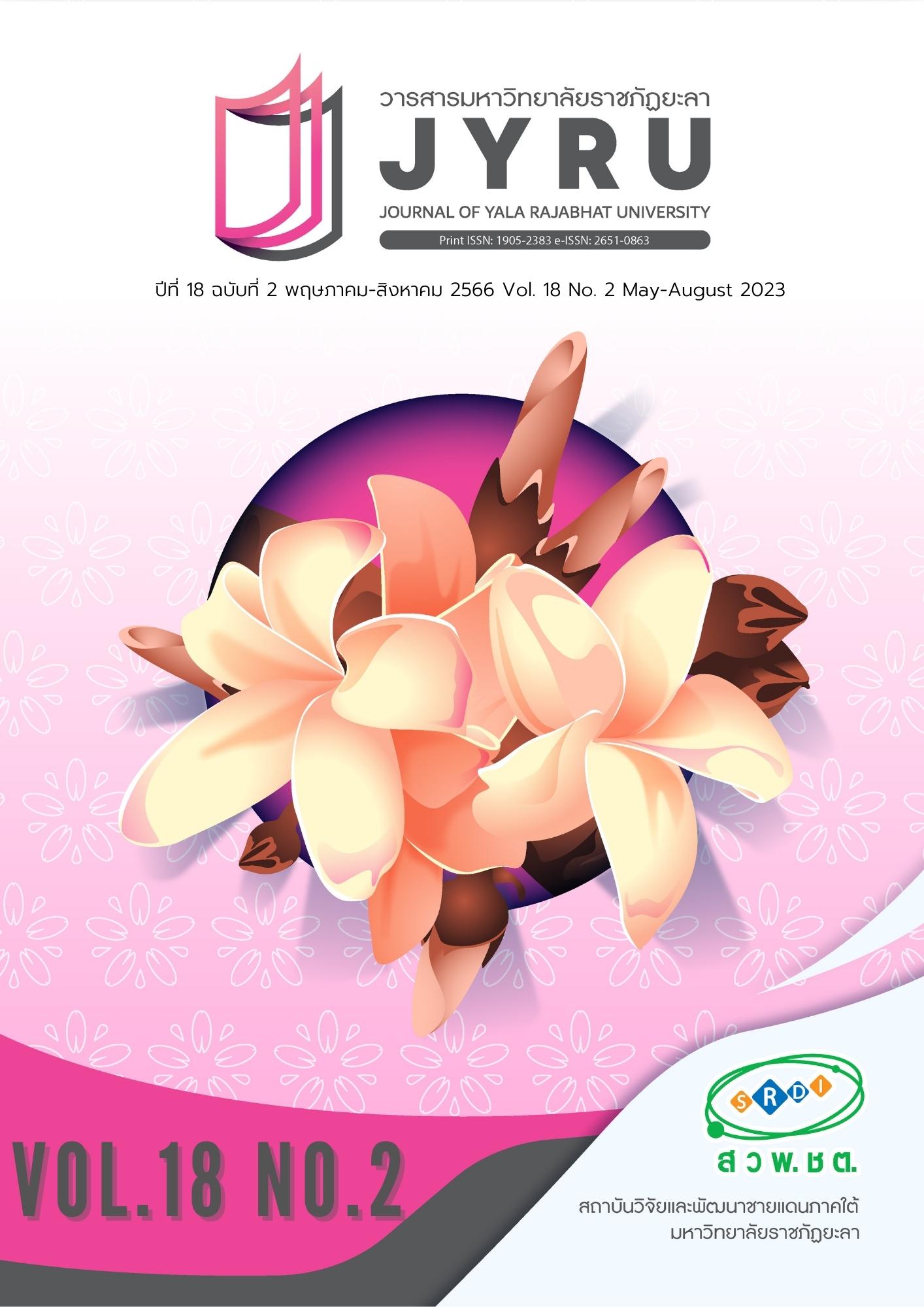การประเมินหลักสูตรศิลปศาสตรมหาบัณฑิต สาขาวิชาภาษาไทยและภาษาไทยประยุกต์ หลักสูตรปรับปรุง พ.ศ. 2562 คณะศิลปศาสตร์ มหาวิทยาลัยสงขลานครินทร์
Main Article Content
บทคัดย่อ
การวิจัยครั้งนี้มีวัตถุประสงค์เพื่อประเมินและนำเสนอแนวทางการปรับปรุงหลักสูตรศิลปศาสตรมหาบัณฑิต สาขาวิชาภาษาไทยและภาษาไทยประยุกต์ หลักสูตรปรับปรุง พ.ศ. 2562 คณะศิลปศาสตร์ มหาวิทยาลัยสงขลานครินทร์ โดยประยุกต์ใช้แนวคิดการประเมิน CIPP โมเดล และทำการวิเคราะห์ข้อมูลด้วยการหาค่าเฉลี่ย ส่วนเบี่ยงเบนมาตรฐาน และการวิเคราะห์เชิงเนื้อหา ผลการวิจัยพบว่า 1) ด้านบริบท ด้านปัจจัยเบื้องต้น ด้านกระบวนการ และด้านผลผลิต มีความเหมาะสมในระดับมากที่สุดทุกด้าน โดยมี 2) แนวทางการปรับปรุง คือ ด้านบริบท ปรัชญาและวัตถุประสงค์ ควรเพิ่มบริบทการสอนภาษาไทยเพื่อชาวต่างชาติ การสอนแบบชุดรายวิชา ควรคงจำนวนรายวิชาตามโครงสร้าง แผน ก2 หมวดรายวิชาบังคับ แต่ควรเพิ่มเนื้อหารายวิชาด้านการสอนภาษาไทยเพื่อชาวต่างชาติ การสอนภาษาไทยในศตรวรรษที่ 21 นวัตกรรม และภาษาไทยถิ่นใต้ ด้านปัจจัยเบื้องต้น ควรเพิ่มผลงานวิจัยและประสบการณ์ด้านการสอนภาษาไทยเพื่อชาวต่างชาติของคณาจารย์ เพิ่มหนังสือตำราด้านภาษาศาสตร์ภาษาไทย ด้านกระบวนการ ควรเพิ่มการสื่อสารแนวปฏิบัติในการบริหารจัดการหลักสูตรและแผนการจัดกิจกรรมสนับสนุนการเรียนรู้ และหาวิธีการสอนใหม่ ๆ และด้านผลผลิต ควรนำคุณลักษณะที่โดดเด่นของมหาบัณฑิตไปกำหนดเป็นคุณลักษณะพิเศษของนักศึกษาระดับบัณฑิตศึกษาและผลลัพธ์การเรียนรู้ระดับหลักสูตร ผลการวิจัยนี้สามารถเป็นแนวทางให้แก่หลักสูตรด้านภาษาไทยอื่น ๆ ที่คล้ายกันในการประยุกต์ใช้เพื่อการพัฒนาหลักสูตรอย่างเป็นระบบเหมาะสมกับบริบทของหน่วยงานตนเองต่อไป
Article Details

อนุญาตภายใต้เงื่อนไข Creative Commons Attribution-NonCommercial-NoDerivatives 4.0 International License.
บทความ ข้อมูล เนื้อหา รูปภาพ ฯลฯ ที่ได้รับการเผยแพร่ในวารสารมหาวิทยาลัยราชภัฏยะลานี้ ถือเป็นลิขสิทธิ์ของวารสารมหาวิทยาลัยราชภัฏยะลา หากบุคคลหรือหน่วยงานใดต้องการนำทั้งหมดหรือส่วนหนึ่งส่วนใดไปเผยแพร่ต่อหรือกระทำการใดๆ จะต้องได้รับอนุญาตเป็นลายลักษณ์อักษรจากวารสารมหาวิทยาลัยราชภัฏยะลาก่อนเท่านั้น
เอกสารอ้างอิง
Boonprasert, P. (2016). The status of research in teaching Thai as a foreign language at the universities in Thailand. Journal of Liberal Arts Ubon Ratchathani University, 12(2), 207-222. (in Thai)
Chantarotron, N. & Yatiakaravong, P. (2022). Curriculum and instruction development. Mahachula Academic Journal, 9(1), 336-347. (in Thai)
Chintapanyakun, T., Ruaengsri, S., Laksana, K. & Lhongsap, P. (2017). The new curriculum evaluation: CIPPIEST model. Journal of The Police Nurses, 9(2), 203-212. (in Thai)
Cortina, J. M. (1993). What is coefficient alpha? an examination of theory and applications. Journal of Applied Psychology, 78(1), 98–104.
Education and Innovative Learning Academy. (2019). Supplementary documents from the workshop “Improving the curriculum following outcome-based education (OBE) guidelines” [Online]. Retrieved September 7, 2022, from: https://eila.psu.ac.th/service-academic/obe/. (in Thai)
Hemapandha, C. (2018). An evaluation of master education program in curriculum and instructional development revised edition B.E. 2013 using CIPP evaluation model. Narkbhutparitat Journal Nakhon Si Thammarat Rajabhat University, 10(Special Issue), 213-221. (in Thai)
Homfung, C., Ruamsuk, S., Natha, N., Khumnungphon, R., Punyajirawiti, W. & PungPong, P. (2016).
An evaluation of bachelor of education program in Thai language Faculty of Education, Silpakorn University. Veridian E-Journal,Silpakorn University, 9(3), 408-420. (in Thai)
Intaprom, W. (2019). Analysis and presentation of qualitative data analysis. Academic Journal Phranakhon Rajabhat University, 10(2), 314–333. (in Thai)
Kaewbut, P. (2021). The study of Chinese curriculum development in accordance with the OBE guidelines: a case study of Chinese for business communication program, Prince of Songkla University, Surat Thani Campus. Journal of Liberal Arts Prince of Songkla University, 13(1), 236–264. (in Thai)
Kanjanawasee, S. (2015). CIPP model for change: meaning, importance, and development. Social Science Research Association of Thailand Journal, 2(1), 3-10. (in Thai)
Klinsuwan, P. (2020). Evaluation of the Ph.D. curriculum in social welfare administration. Journal of Social Synergy, 11(1), 74-87. (in Thai)
Likert, R. N. (1970). A technique for the measurement of attitude. Attitude Measurement. Chicago: Ronal McNally & Company.
Patphol, M. (2019). The concepts of curriculum development. Bangkok: Innovative Leader Center of Curriculum and Learning. (in Thai)
Prince of Songkhla University. (2017). The 20-year long-term development plan of Prince of Songkla University (2017–2036 B.E.). Songkla: Prince of Songkhla University. (in Thai)
Ruamsuk, S., Watanatanom, M., Buasomboon, B., Makjui, A., Chamnanrua, B. & Homfung, C. (2016). An evaluation of master of education program in teaching Thai language Faculty of Education, Silpakorn University. Veridian E-Journal,Silpakorn University, 9(1), 1117-1128. (in Thai)
Sangngam, K. (2022). Challenges in and strategies for developing graduate programs following outcome-based education (OBE): A case study of the master of arts program in applied English language studies, Faculty of Liberal Arts, Prince of Songkhla University. CUAST Journal, 11(2), 124-136. (in Thai)
Stufflebeam, D. L., & Coryn, C. L. S. (2014). Evaluation: theory, models and applications (2nd ed.).
San Francisco: Jossey-Bass.
Yanawongsa, T., Intasingh, S., Nguenyuang, S. & Intanet, N. (2021). Outcome-based curriculum: new approach for higher education curriculum. Humanities and Social Sciences Journal of Pibulsongkram Rajabhat University, 15(2), 279-291. (in Thai)


